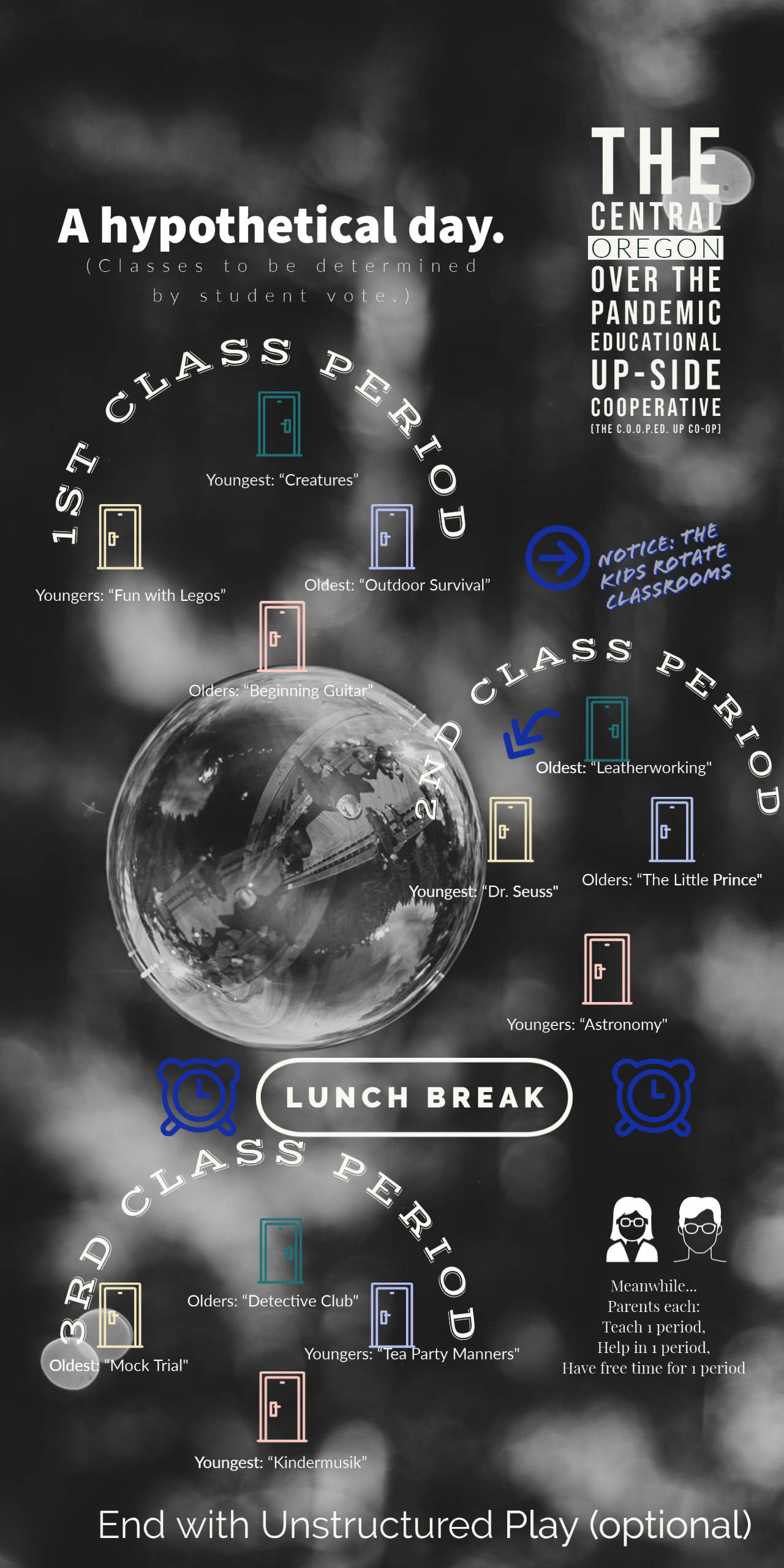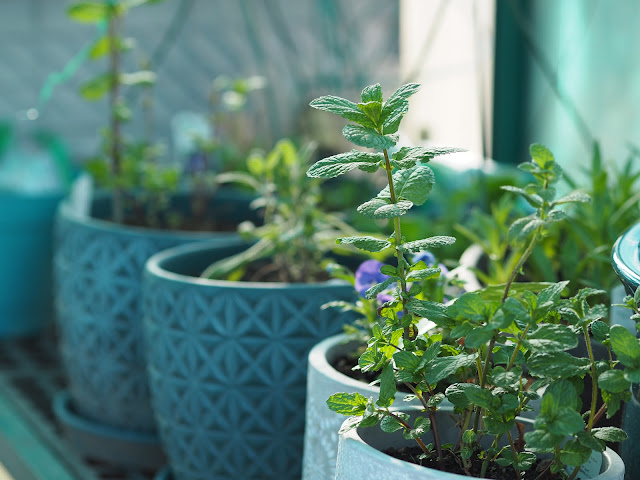How Co-ops and Micro-Schools Can Help
It's right under our noses: an educational model that can help parents juggle work and homeschooling, helps kids reconnect, and helps keep the transmission of COVID-19 down.
My state just released the guidelines for reopening schools in the fall. It's going to be a wild ride, and I'm glad that option is available; however, we need other options. Homeschool co-ops and micro-schools can help.
It's not a new concept (homeschoolers have already been doing this for decades), it's practically free, local, self-sufficient (taught by parents), requires no technology, can be tailored to suit individuals, and it adapts to local stay-at-home guidelines.
We've learned that if we don't work together, we'll go stir-crazy.
Some of us never intended to homeschool. Some of us are old-school homeschoolers that miss networking with other families. We all feel the need to be creative and flexible.
How in the world can we expect kids to keep 6 feet apart?
I can't even keep my kids 6 inches apart.
Maybe we can have students attend in shifts and wear PPE?
I took my 6-year-old to the grocery store a month ago, and I asked him to wear a mask. He was willing, but by the time we were through the produce department, the mask was soaking wet with saliva, and we sounded something like this: "Don't touch your mask."
"Can we get these?"
"No. Don't touch your mask."
"Please?"
"No. Don't touch those. You're getting whatever germs were in your mouth all over store."
"Okay."
"Put your mask back on...no, don't touch your face."
"I washed my hands before we left, mom."
"Yes, but--don't touch your mask--and don't touch those!"
Being in our own home, where we don't have to be so careful about what we touch and who we breathe on, is nice in comparison. But it's lonely.
And online learning is...dull. When we spend too much time on screens, even when it's "educational", we get cranky. We become stiff, selfish, impatient, glassy-eyed. And the young children, oh wait and the older children, and the adults, do not have enough self-regulation to know when to turn it off, and when we are wasting time.
There are so many resources online, but my family has found the best balance for us is for school to be about 15% on a screen, and 85% off. We tried engaging with other kids online via zoom, etc, but it just wasn't enough. We miss sharing a space with other learners.
Hopefully, when school begins again in the fall, my kids can be in groups that are both socially responsible, and yet, still human.
We need a social-educational model that is flexible. One that can adapt to SARS-CoV-2's daily whims.
What we need is smaller groups.
Here is where the concept of quarantine bubbles comes in. They're like families, only a little bit bigger.
In a co-op, parents can decide how big they want their co-op to be, whether that's 25 people, or 10. Micro-schools and Co-ops can support homeschoolers and distance learners move through recovery. They could be the rest stop between self-isolation at the family level and full exposure to the general public. They need not supplant curriculum or public school teachers or online learning--they supplement it.
And so, without further ado, I am starting a new Co-op where I live.
If you are considering starting a co-op, I recommend going for it. Here are the basics:
Step 1. Decide what you want to get out of a co-op. Decide what you want for your kids.
Step 2. Find other families. Find families who need mentoring, families who are different from yours, families that lack resources or confidence, kids who need your help (an opportunity for social change, yay!) Also, find families with whom you agree on educational philosophies, friends who will support you, kids with whom your children have a special connection, and passionate parents who are willing to teach with enthusiasm. When you've reached capacity, you can build a waiting list.
Step 3. Discuss the details (like location, frequency, classes, costs) with the other parents. Make sure the students have a voice too. If your families include babies and toddlers, have a plan for them so that when it's their turn, the parents can teach with their hands free. If the other parents need to work, find a way to work around schedules so that everyone can pitch in. I recommend leaving the work of the core subjects (reading, writing, and math) for home days, and choosing fun stuff for community days. The combined knowledge among co-op parents can be staggering. Find out what they love to learn, and encourage them to teach that.
Thanks to the people at Memphis Homeschool Enrichment Cooperative for many of the good memories I have of Co-ops.
Wondering how to set up a teaching rotation?
Here is a list of course ideas to get the juices flowing:
Ukulele, Critical Thinking and Logic, Not Your Average Communications Class, Genetics, Communication Confidence, SafeSitter, Chess, Logic, Civics, World Geography, Shakespeare, Into the Wardrobe, Creative Cupcakes: Beginning Cake Decorating, Caring Quilts, Greek and Roman Mythology, Mock Trial, Pee Wee Psychology, Ancient Civilizations, Creative Writing, Human Anatomy/Physiology, Poetry, Civil War, Literature, Photography, Music Theory, Beyond "Google It": Research Skills, Meet the Masters: Art History, This is My Country, That's Greek to Me!, Economics, Order in the Court, Geography/Heritage, Creative Writing/The Little Prince, Essay Writing, Banned Books, Health/Nutrition, Atoms, Philosophy, Euclidean Geometry, Ergonomics, Weather, Movement, Fitness, Literary Elements, Health and Nutrition, Geology Rocks!, Art, Nifty Fifty States, Tennessee History, Outdoor Survival Skills, Fun With Music, Leatherworking, Upcycling, Exploring Machines (using K'nex Education), P.E., Eat Your Way Around the Globe (Global Cuisine), Botany 101, Knitting, using a loom, Beginning Guitar, Basketball Skill, Drills and Games, The Lewis and Clark Expedition, Book Club, Art Through the Ages, What's Cooking, Social Shuffles: Line Dance an Hip Hop, Astronomy, Physics, The Thinking Toolbox, Alchemy 101: Transform one food into another, Brain Games and Thinking Skills, Intro to Poetry, Crazy Stories With Vocabulary, Cultural Exploration, An Eric Carle Author Study, If You Were a Pioneer on the Oregon Trail--A Live Game, It's a Small World, Detective Club, Zoology I and II, Map Making, The Human Body, American History, Old Fashioned Games, Simple Machines, The Scientific Method, Art, Taste of America, It's Alive! Life Science, Memory Songs, P.E., Geography, Spanish, American Girl History, Chess, Art Around the World, Elementary Latin, Money, Landforms, Math Games, Gross Motor Math, Tea Party/Manners/Sewing, Math and/or Word Art, Things That Fly, Little Engineers, Fairy Tales, Simple Astronomy, Learning with Literature, Botany/Art, Theater, Show & Tell Public Speaking, Dr. Seuss, Art, Music, Science Exploration, Kindermusic, Gross Motor/Fine Motor, Theme Weeks, Music in Motion, Fun with Legos, Storybook Theatre, stART=Stories Plus Art, Circle Time, Books Alive!, Hands On Science, Amazing Animals, Folktales, Five in a Row/Before Five in a Row, Creatures, Rhythm and Movement, Puppet Show, Music Makers, When I Grow Up: Community Helpers, Curious George, Let's Pretend, Story Time, Mathletics, Singing Time, Story Time, and Playtime.
If you live in Central Oregon (Bend, Prineville, Redmond, Powell Butte, or Terrebonne), and you're interested in joining my co-op or finding an existing one, comment below this post.
After this is "all over," we're going to know a lot more about education, and what we need as humans, and how to console, and how to survive.
We're going to get through this crisis together. We are the human race, after all. Learning is what we do best.











Comments
Post a Comment